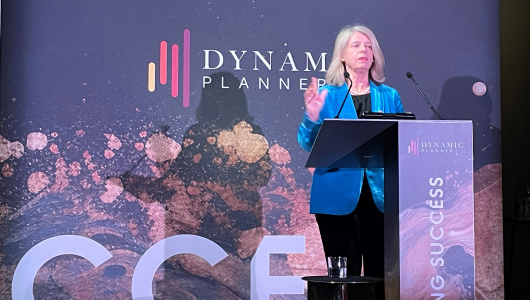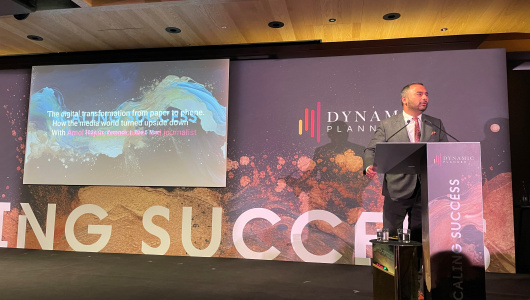Access to advice “should cost taxpayers nothing”, said Harriet Baldwin MP at Dynamic Planner’s Scaling Success conference today (5 March).
Baldwin, chair of the Treasury Select Committee, was giving the keynote address entitled ‘The critical need for accessible financial advice and guidance in the UK’.
While praising the quality of the attendees at the conference, Baldwin stressed that “most of my constituents won’t be able to tap into your expertise” due to financial barriers.
She used the analogy of a supermarket that charges an upfront fee for “lots of healthy options, meal plans and easy-to-cook recipes”, while most people are “stuck in the free section with poor options and potential scams”.
Such a system for supermarkets would cause uproar, Baldwin pointed out, yet that was the situation when it comes to financial advice for the vast majority of the UK population.
“Only the rich, the 8%, can benefit from the healthy financial options. The remaining 92% are being left in the generic aisles,” she said.
Generic advice that doesn’t relate to personal circumstances has potentially terrible long-term consequences for the nation’s saving health, Baldwin warned, with people not knowing who to trust.
She told the story of going to the FCA homepage and seeing articles entitled ‘Crypto: The Basics’ and ‘Investing in Crypto’. Although not recommendations, Baldwin felt the prominence of these articles “ended up looking like an endorsement”.
Despite concerns from some consumer groups, Baldwin stressed the need to expand advice by moving closer to the advice-guidance boundary and giving advisers more leeway.
The solution, said Baldwin, is more targeted support and simplified advice at a price that is commercially viable. Moreover, “innovators will find ways to deliver more personalised advice” using smart technology, behavourial models and artificial intelligence.
She added that “doing nothing about the advice gap is also a choice”, one that will lead to greater harms.
Asked about financial advice being taught in school, Baldwin agreed that this was important but that it “would not solve the problem of getting people to make more informed financial decisions”.
















So advice to cost ‘nothing’ then, I was always taught that if it costs ‘nothing’ it’s worth ‘nothing’? Who will then pay for the knowledge to be acquired to give the advice? Govt? Post Office?
The solution, said Baldwin, is more targeted support and simplified advice at a price that is commercially viable. Moreover, “innovators will find ways to deliver more personalised advice” using smart technology, behavourial models and artificial intelligence.
I have long argued that it should be possible to make advice more customer friendly and cost effective but needs lots of regulatory change
Forget AI – This is lazy thinking because you can replicate the brains of a good adviser!!
MPs should also work for free
I find the comparison between a professional (potentially chartered), preparing a bespoke financial plan, and someone making dinner rather misleading. In addition, I dont remember the last time a supermarket employee led me round the store, filled up my trolley and then ensured I paid in a tax efficient manner, came round to my house to ensure my cooking was still “on point” and my ingredients still suitable to recommend, for my particular set of cooking apparatus, given my age and personal/financial situation…..perhaps I’m missing something.
Is this a return to advisers giving advice and not being paid for their experience, expertise and knowledge. So is the logic that advisers are being expected to provide their services for free so that all tax payers can have the same opportunities. The analagy of the supermarket doesn’t work because everyone has a choice – and that choice is whether to purchase a brand name or supermarkets own or a £20 bottle of wine or £5 – but either way the customer is paying for something and not getting it for free. They can browse the aisles they can enter the supermarket and they can walk out empty handed. If a customer wants to sit and have a conversation and receive advise then that is time that had a value and cost
would we get charitable status then?
I wish I knew why financial advice taught in schools “would not solve the problem of getting people to make more informed financial decisions”. Surley if peiople knew some basics like the cost of credit, and the benefits of compound interest and pund cost averaging, then they could make far better decisions? Maybe it is just me….
The whole system is flawed and you have to be so careful with the advice you give otherwise the claims management guys with no win no fee are on your case.
There are people who will simply not pay for advice and think they can make their own decisions but then do not want to consider any consequences of this own actions.
The supermarket is not really a comparison as you are comparing foods today and not in many years down the line. After all we all have to eat but thinking of your financial future is something a lot different.
Calls for simpler and more affordable advice have been going on since time immemorial but it’ll never happen because of:-
1. Unrealistic consumer expectations,
2. The FCA’s refusal/constitutional unwillingness to simplify anything,
3. The complexity and constantly shifting sands of the tax system and
4. CMC’s.
On board with that as soon as MPs and Ministers take no pay.
Incredible! I always thought this lady had a brain. To think she is on the Treasury Select Committee (of what? Finance?) Ted has it right. Moreover, does it not occur to her that we are in business to make money. What with all the costs – FSCS, PII and expensive imposts by the Regulator does she really think we can work for nothing? Or has she been mis quoted or quoted out of context?
Of course the 8% can afford our services. That is the sector we try to attract. Why would be interested in attracting the impecunious? The secret is in our title – FINANCIAL Advisers.
Will she say the same thing to Solicitors and Accountants? Surely their services also shouldn’t only be available to the wealthy?
Anything free is an invitation for crooks to find Simpletons. Chat boards are unsuitable.
London South East
Mapp LSE chat
Well good luck with that Harriet, on that basis all politician’s should work on Pro Bono
Harry Katz has it right.
I am always happy to offer a free 1/2 hour meeting to determine whether I am able to assist a client but advice (particularly advice where I am second-guessed by CMCs and the FOS) cannot be free.
We need a Financial Health Service for the masses. Local clinics paid for through taxation. Means tested so anyone earning less than £50k is able to obtain advice. Advisers employed by the FHS with simplified regulation. Simples!
I always associated investing with with capitalism. So I hope you will understand my confusion at the concept of investment advice being socialised.